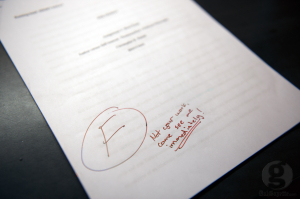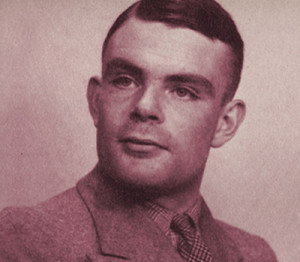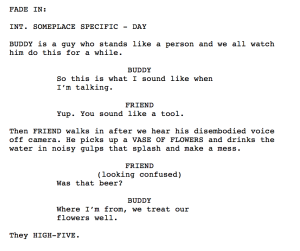 I.
I.
Tuesday night in Uses of Humor in Writing we talked about Larry Wilmore’s notion of dominance as a standup comic. You have to immediately show dominance in front of an audience, but you also need to be self-deprecating. How does this work? How does this translate to our jobs as writers? You show dominance formally—i.e., you establish authority through your skillful use of language, tone, voice, and such—and self-deprecation in your content—i.e., in what you say with that dominant pose.
The schlimazel is a good target persona to adopt, I suggested, and then gave a rundown on these classic vaudeville archetypes, which to render in the shortest of shorthands: the schlemiel spills the soup on the schlimazel, the schmendrik rushes to clean it up, and the schmuck stands back and laughs at them all.
The schlimazel is classic because s/he’s blameless, and because we so often feel as though the world is spilling all its shit on us. Relatable, so. And I mentioned that you see these figures all the time in sitcoms and such, but that the majority of standup comics play the schlimazel.
Then I, not any of my students, but me, there at the head of the classroom, pointed out how the original characters of It’s Always Sunny in Philadelphia map out precisely to these four:
- Mac, as a general fuckup, is the schlemiel.
- Dee, who always gets shit on and, like, her car ruined, is the schlimazel.
- Charlie, the janitor, so often gladly the butt of jokes, is the schmendrik
- And Dennis, being Dennis, is the schmuck.
It’s worth noting that Frank wasn’t originally on the show, and that this idea was my own.
II.
For the first time in my 10 years of teaching I taught “Slouching Towards Bethlehem” to graduate students Wednesday night. Also, the first time I taught it in San Francisco. Most of the action of the essay takes place three blocks down the hill from our building. You’ll remember that the essay has a fractured, splintered structure. Lots of mini-vignettes of the hippie kids Didion finds to illustrate this culture they’re building in the Haight.
The question is how does Didion make the essay so engaging when her scenes are so choppy and minimal? I flipped through the pages and noted for the students, rather than the other way around, that practically every vignette opens with a person or people, a concrete place or object, and some immediate conflict. “Don and Max want to go out to dinner but Don is only eating macrobiotic so we end up in Japantown again.” “Arthur Lisch is on the telephone in his kitchen, trying to sell VISTA a program for the District.” It’s not every vignette, but pretty much all of them start this way, and another point I had to make to my students—and not that one of my students had to make to us all—was that this approach to economy never felt repetitive or simplistic.
Yeah, I know, I’m a great teacher. Ask Bria, say, or Robert. They’ll tell you.



 There are days that I miss it, because I have friends I care about in my life and this for so long was how I kept in touch with them. Plus most of them are funny and write entertaining tweets. I miss those. I don’t miss them as much as I miss them, my friends, but I miss them.
There are days that I miss it, because I have friends I care about in my life and this for so long was how I kept in touch with them. Plus most of them are funny and write entertaining tweets. I miss those. I don’t miss them as much as I miss them, my friends, but I miss them.
